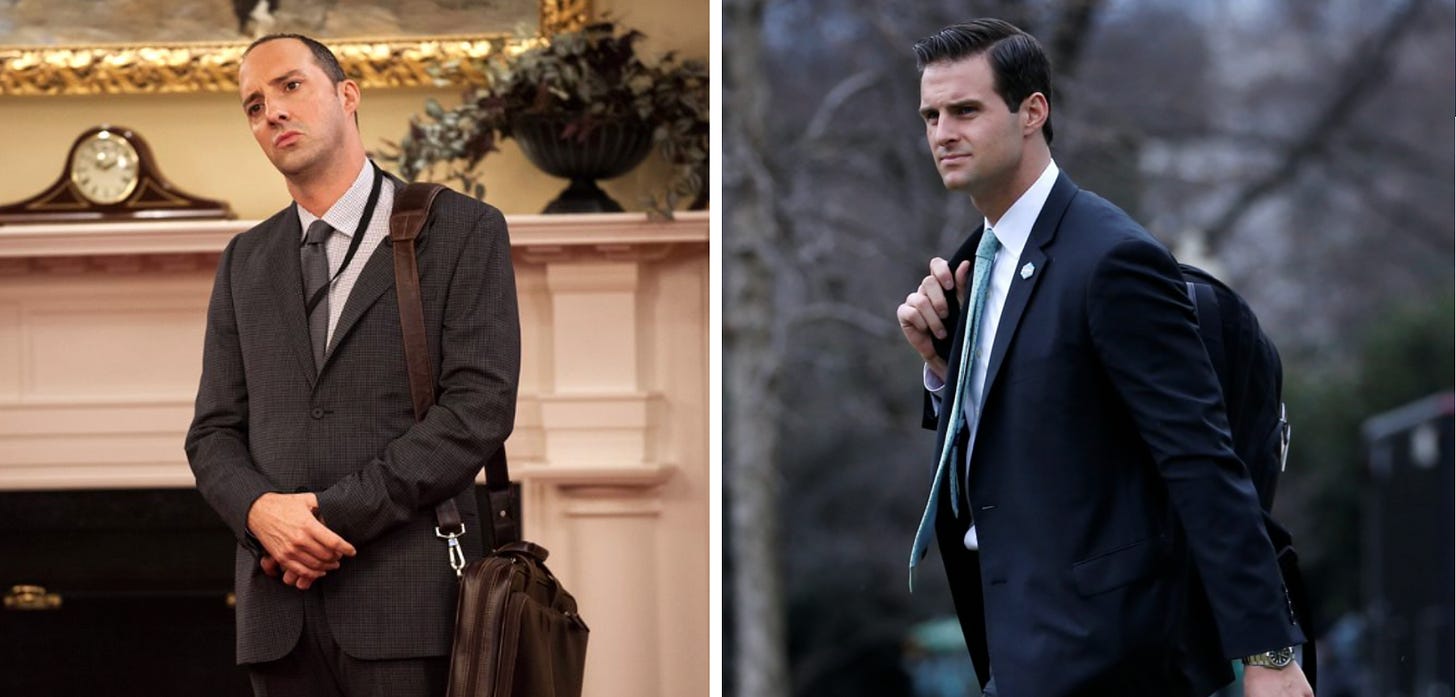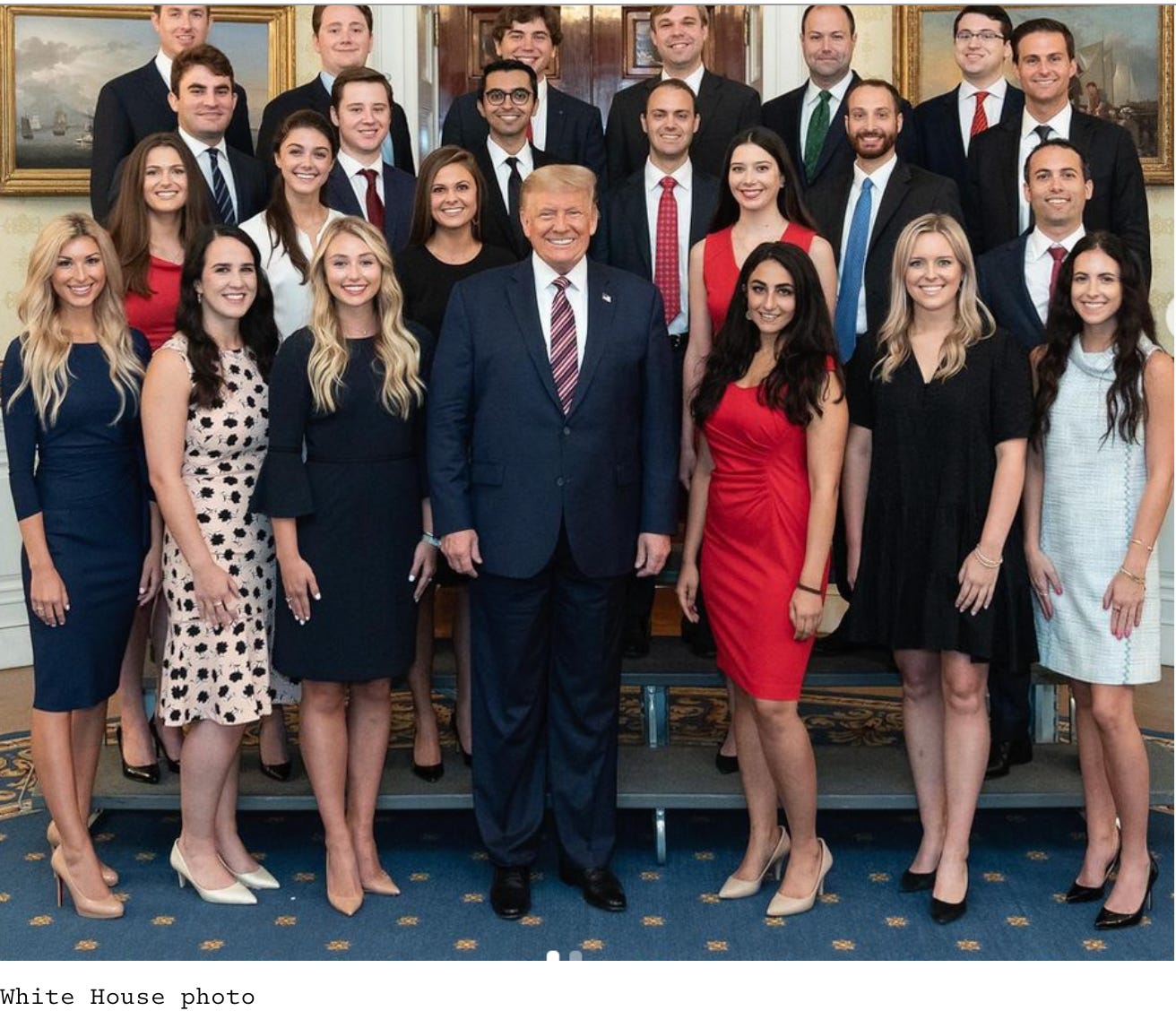Come gather round and hear the tale of Johnny McEntee: a simple college quarterback-turned-body-man-turned-political-enforcer. By the end of the Trump administration, young McEntee had risen to the position of Director of the Presidential Personnel Office and held the ear of the President himself. Some even called him the Deputy President.
All Presidents face a standard governing problem: how to balance expertise with political control. McEntee’s story exemplifies the price of Trump’s obsession with loyalty, a price that the rest of us paid in the form of poor government performance during a catastrophic pandemic.
You probably have not heard of Johnny McEntee. He is not a household name. But you have almost certainly seen him in the background, a Zeligesque presence. He started with Trump during his presidential campaign as his body man. In other words, the guy who carted around Trump’s stuff, a position made famous by Tony Hale in Veep.
Who wore it best?
Photos: HBO; Leah Mills, Reuters
McEntee’s role offers insights into what a second Trump administration would look like, showing us the type of people Trump would empower when he felt no compulsion to hide his desire to assert absolute political control. A new profile of McEntee in the Atlantic by Jonathan Karl, plus prior work by Jonathan Swann, Dan Diamond and others describe McEntee’s rise to power and his use of that power.
Understanding Trumpism means understanding people like McEntee, the loyal follower willing to put ideological hacks in scientific agencies amidst a pandemic, to assert false claims of election fraud, and to use the power of the White House to seek to overturn the election.
Fired, then promoted
In a normal administration McEntee would not have amassed the power that he did. Indeed, McEntee was fired from his body man gig during John Kelly’s doomed effort to restore some sense of normalcy to Trump’s White House. A background check revealed that McEntee had failed to disclose income, which turned out to be from gambling winnings. Trump recalled him in January 2020, first to retake his old position, and then to lead the Presidential Personnel Office.
The job of the PPO is to help place political appointees in government, filling out 4,000 or so slots. In part, this involves hiring people who need to be rewarded – campaign staffers, donors, or the well-connected. It also involves blooding up-and-comers in the party, giving them experience they might use to climb the political ladder. But a key aspect of the job is also hiring people with the skills needed to advance the President’s agenda. That implies not just sharing the President’s goals, but also having the expertise to implement them. Hire too many unqualified loyalists and the performance of the government, and the ability to achieve the President’s goals, suffers.
The best research evidence we have is that political appointees perform less well than career appointees, and the driving factor is experience: short-term inexperienced appointees undermine the quality of organizational outcomes. This doesn’t seem especially surprising. We don’t expect newly minted college graduates with little relevant experience to take over key roles in important organizations, but this became the norm in Trump’s last year, facilitated by McEntee.
The cost of political loyalty to governing is sometimes hard for the public to see. FEMA is a good example. For years, it became a “turkey farm” of unqualified appointees because Presidents did not think it mattered all that much. That’s how Michael Brown, the former supervisor of the judges at the International Arabian Horse Association, became the face of government failure during of Hurricane Katrina.
In the last months of a normal Presidency, appointing a 29 year old with no obvious qualifications to lead the PPO might not have been such a big deal. But this was anything but a normal time in a normal Presidency.
McEntee was a young unqualified appointee who promoted even younger and less qualified loyalists. Trump, who obsessed over physical appearance of staff, might have approved of another criterion in hiring. According to a former Trump staffer, McEntee picked “the most beautiful 21-year-old girls you could find, and guys who would be absolutely no threat to Johnny in going after those girls…It was the Rockettes and the Dungeons & Dragons group.” This seems harsh on the fellas, but y’all can judge for yourself on that one.
So what happened when McEntee took control?
Proving loyalty
McEntee told existing appointees across government – that is, people who had stuck with Trump throughout his chaotic reign or chosen to join him at the end of his term – that they would need to sit down for a job interview for a a job they already held. The questions they faced centered on loyalty to Trump, and even aspects of Trump’s agenda that was irrelevant to their actual job. EPA officials found themselves answering questions about their featly to Trump’s Afghanistan withdrawal policy.
Thus, time that should have been spent responding to a surging pandemic was instead spent on preparing for loyalty tests. The culture this created – where officials were reluctant to challenge Trump’s rosy prognostications about the pandemic – undermined the ability of the government to respond. For example a group of McEntee’s appointees attacked a veteran CDC official when she urged the public to wear face masks.
McEntee’s enforcers tracked Trump appointees social media. As part of their interviews, appointees were asked to list all of their present and past social media posts, and warned “it is better not to go through your accounts and delete posts prior to the vetting process as the offending posts are often recoverable.”
A surreal example of the social media obsession came when Mark Meadows, the President’s Chief of Staff, was pulled out of Amy Coney Barrett’s confirmation hearing so one of McEntee’s staff could reveal that a low-level assistant and Taylor Swift fan at HUD had liked a Taylor Swift post that seemed to endorse Biden.
Loyalists versus reality
McEntee installed Trump loyalists as liaisons between agencies and the White House across government. They frequently combined youth, inexperience, pettiness, and radical views. Some examples:
*An anti-abortion activist lectured Attorney General Barr that he needed to do more to stop the election being stolen from Trump.
*A 25 year-old threatened DHS staff that he would “go to their house and burn it down” if they didn’t follow his orders.
*McEntee hired a liaison to USAID who had previously seen her efforts to get a Trump job blocked for her inflammatory comments, such as attacking liberal democracy and criticizing the “homo-empire.”
Some Trump Cabinet Secretaries fought back, even if they could not fire their tormentors. Barr banned his liaison from the DOJ building. Others left. The head of the US Office of Personnel Management, who nominally held sway over the entire federal government personnel system, resigned when McEntee told her she now answered to her White House liaison.
It wasn’t just liaisons to the White House. Across government, McEntee tried to install key hires at odds with the wishes of the Cabinet secretaries and agency heads they were expected to work with.
Such hires made for bad outcomes. For example, Michael Caputo became the HHS spokesperson during the pandemic. Caputo was an idealogue lacking back medical or scientific background. That didn’t stop him from attempting to alter CDC scientific reports.
Emily Miller became an FDA spokesperson despite a record of sharing COVID misinformation. She was removed from this position after the FDA and Trump touted a new miracle cure that would reduce COVID by 35%, a claim the FDA commissioner would have to very publicly walk back, hurting the credibility of the agency at a time when such credibility was vital.
Loyalists versus democracy
Loyalty can easily become extremism. A fierce commitment to a single person (especially if that person is also your meal ticket) can erode commitments to other values, such as democracy or the constitution.
When he was first fired, McEntee’s fallback was working with the Trump campaign. Thats a less impressive gig than working directly outside the Oval Office, and being able to threaten Cabinet officials. As a 20-year old that McEntee hired put it: “Only in Trump’s America could I go from working in a gym to working in the White House, because that’s the American dream.” Only in Trump’s America.
Loyalists are loyalists partly because they believe in the Great Leader, but also because they are loyal to what he can offer them.
McEntee would become part of the cabal seeking to overturn the 2020 election outcome, part of the Trump entourage that reinforced his worst instincts. He contacted Pence’s Chief of Staff offering a wild and historically flawed account of how Jeffersonian precedent allowed the Vice President to use his powers to hand the election to Trump.
Beyond McEntee’s failed constitutional arguments, his program of loyalty-first hiring meant that more officials across government were willing to go along with Trump’s Big Lie claims. A government full of such people would be less able to withstand another constitutional crisis.
None of this is normal but it might be the future
At the beginning of his administration, Trump was somewhat constrained. He lacked a bench of strong potential appointees. He had to accept appointees who held private misgivings about Trumpism.
This will not be the case in 2024.
The Republican Party is now a subsidiary of Trump enterprises. Plenty of ambitious Republicans would gladly join his administration. Such appointees might be more effective in managing government, or at least achieving Trump’s stated policy goals. But what McEntee’s tenure shows is that Trump has found a means to satisfy his demands for loyalty that he lacked in 2020, and which he came to regard as essential to governing. His late term emphasis on political control of both the bureaucracy and his own appointees offers a glimpse of his Day 1 modus operandi for any second term.
If you liked this post, you might enjoy: You Should Be More Worried About Politicization of the Career Public Service. Please consider subscribing to “Can We Still Govern?” if you have not done so already.





